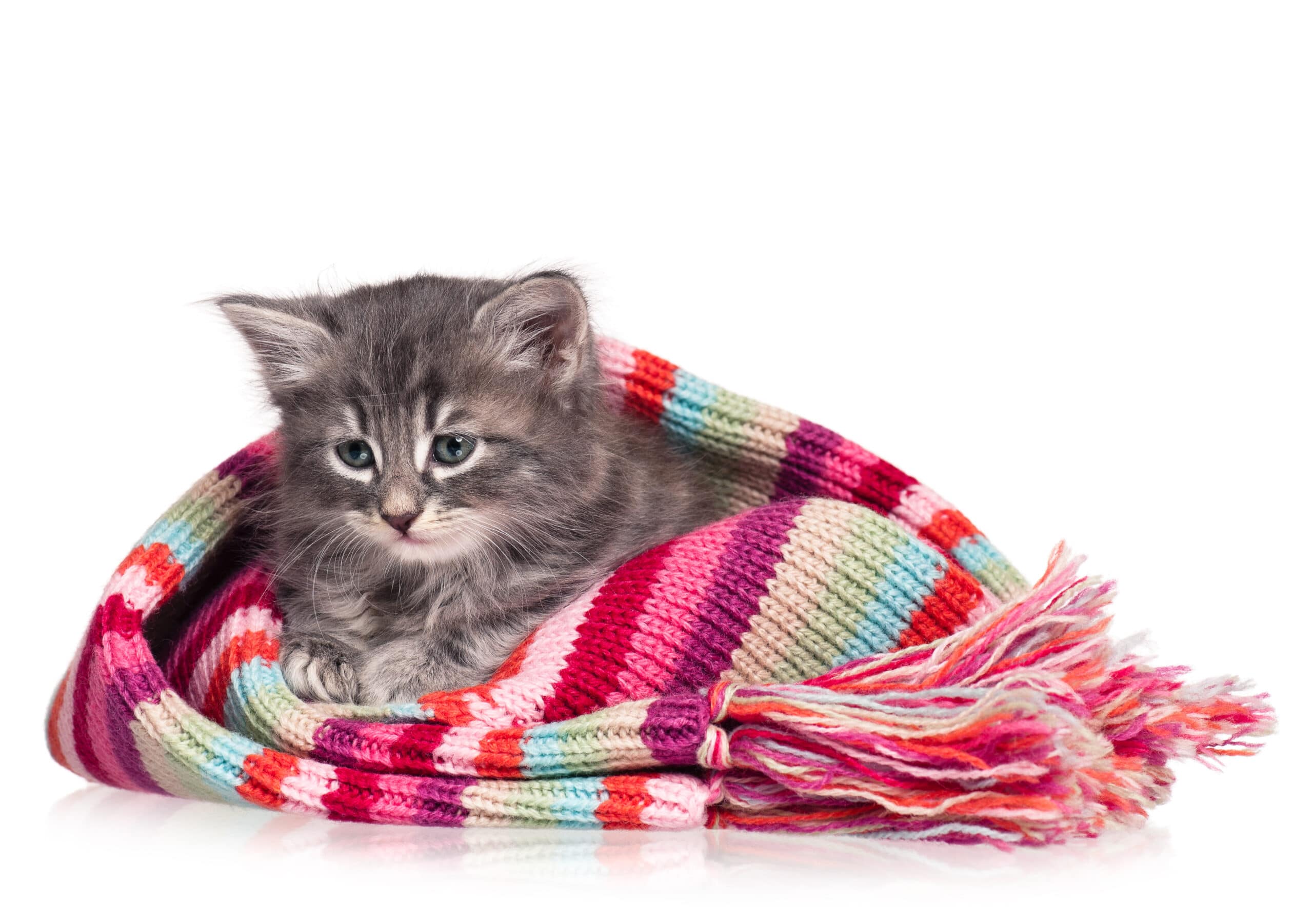How to soothe a crying kitten? Top 7 tips for a quiet night
How to soothe a crying kitten is a question that baffles many new pet parents. But don’t worry we have the answer for you.
A new kitten in the home is a welcome addition, but these cute little ones have several needs that you as the pet parent need to meet.
Your cuddly pet may cry for different reasons, but non-stop crying can be distressing.
It is worse when your kitten starts crying in the middle of the night and you have to be up early for work.
Do not throw in the towel yet. You can fix this.
You need to understand what is causing your kitten to cry before you can figure out how to soothe the kitten and stop its crying.
6 reasons why your kitten is crying at night:
1. Missing her mother or littermates
Perhaps your kitten was separated too early from her mother or littermates. Kittens should stay with their mother until they are able to eat solid food, which is usually around three to four weeks of age.
2. Requires attention
Kittens have more energy than adult cats. A lonely kitten may be looking for someone to play with. In order to be happy, your kitten needs lots of mental and physical stimulation while it’s awake. If a kitten is constantly crying, they might be looking for your attention or calling out in search of another kitten or their mother.
3. Hungry
Hungry kittens, like human newborns, will cry out if they have gone too long without eating. If your kitten is constantly crying for food, review your feeding plan and assess whether you are offering frequent enough feedings.
4. Cold
Newborn kittens are unable to regulate their own body temperature. For the first three weeks, they are completely reliant on the mother, or you by default, for warmth.
When kittens become cold, they soon enter a downward spiral. The metabolism slows, they become too weak to nurse, and blood sugar levels plummet, making them even weaker and bringing the metabolism to a standstill. Coma and death can occur swiftly.
Warm a kitten gently till it is attentive and meowing for food. If the kitten has been warmed but is still dull or unwilling to nurse, there may be a problem. Seek veterinarian care as soon as possible. Never feed a cold kitten who is unable to nurse. This can be deadly.
| Age of kitten in weeks | Ideal temperature in ºF |
| <1 | 85 – 90 |
| 1-2 | 80 – 85 |
| 2-3 | 75 – 80 |
| 3-4 | 70 – 75 |
| 4 and above | 70 |
5. Sick
The kitten’s sorrowful cries could be an indication that it is sick.
Illness may not be obvious to a caretaker, but a kitten’s cries can indicate that something is causing her distress.
You should seek medical attention for a crying kitten if it seems vacant or fatigued.
6. Needs to use the bathroom
It’s not uncommon for kittens to be picky about pooping when they’re first learning to use a litter box on their own.
Kittens under the age of 8 weeks will frequently meow before or during defecation, which is fine as long as the kitten is not straining or unhappy.
Bring a kitten to the vet if she is crying every time she poops, or if she is pushing and struggling to use the litter box. This will ensure that there is no underlying medical concern.
Constipation, diarrhea, and other gastrointestinal issues should be addressed seriously, especially in a small kitten, so don’t wait if you feel the kitten is ill.
Fortunately, you can get the kitten to quiet down by following our 7 tips on how to soothe a crying kitten.
1. Provide a comfortable space

Provide your kitten with a quiet, warm, and cozy space, where she can feel secure.
Remember that your home is a new place that is unfamiliar and big to the little kitten.
You should confine her to one room, like a spare bedroom or a space that you can keep closed. This room will be your kitten’s haven, a place where she can get adjusted to your home without feeling overwhelmed.
The safe room should have everything the kitten needs:
- Litter box
- Vertical scratching post
- Horizontal scratching pad
- Hiding places such as cardboard boxes
- A comfortable cat bed
- Food and water
- Toys
- Carrier which can serve as a hiding place for your kitten; placing a towel in the carrier can make it comfortable enough for your kitten to take a nap if she wants to.
Your kitten will surely cry at least for the first two nights after you bring her home.
The kitten is bound to feel lonely, especially if recently separated from her mother and littermates.
You can make the kitten feel warm and safe by following the below steps:
1. Provide warmth
Under three weeks, kittens can’t control their own body temperature and rely on the external environment to keep them warm. Therefore, place a hot water bottle in the kitten’s bed to help her feel warm and comfortable.
However, ensure that the bottle is covered and not too hot. Do not use boiling hot water from the kettle.
The kitten can also be placed on a heating pad wrapped in towels with the temperature set to lowest level. You can use the heating pad till the kitten reaches 4 to 5 weeks of age or till they start avoiding it.
2. Use a clock
Roll up a ticking clock in a towel and place it next to the kitten; the ticking sound of the clock will remind the kitten of its mother’s heartbeat and comfort her.
3. Fake fur
Place fake fur in your kitten’s basket to help her calm down and feel secure. Cats love fake fur and enjoy kneading it.
2. Plenty of attention

Your adorable kitten has a lot of energy and requires to be active physically and mentally for her to be happy.
A crying kitten may be calling out for your attention, so make sure to set aside plenty of time to play with your new kitten.
Providing interactive toys, placing a bird feeder near the window, or changing the toys often are some ways to help the kitten spend time alone, especially when you are at work.
If possible, you can also adopt an additional kitten as they tend to do well in pairs as they can give each other company.
Be careful when giving attention to your kitten.
You don’t want the kitten to learn that if she cries loud, she will get what she wants from you – treats, play, cuddle, etc.
If you give in every time your kitten cries, you will teach her the wrong behavior.
To reduce attention-seeking meows, you should only respond when there is a genuine need. If you have fed her, played with her and if she is not sick, then it is okay to leave her crying.
3. Your kitten may be hungry

Just like a human baby, your kitten may cry if there is a big gap between meals.
If it becomes evident that hunger is the reason why your kitten is crying, then rework your feeding schedule to make sure that there isn’t too much of a gap between meals.
Signs of a hungry kitten include constant crying, movement of head from one side to the other and suckling on objects.
Adult cat food is not a good source of nutrition for a kitten. Buying a kitten diet that has gone through feeding trials is recommended.
Your kitten is growing and requires plenty of wet food to support her growth.
If you are going to be at work during the daytime, provide a bowl of dry food so that your kitten can nibble on it when hungry.
Avoid leaving wet food as it may get spoiled when out in the open, especially in warm weather.
Though experts recommend a strict feeding schedule for adult cat, you will have to feed your kitten whenever she is hungry.
You should, therefore consider providing more food or increase the frequency of feeding if you feel that the kitten is crying due to hunger.
You can follow a feeding schedule once your kitten is around four months of age.
4. Toilet issues

When a kitten is getting familiar with using a litter box, they may be a bit fussy initially about easing themselves.
It is usual for a kitten under eight weeks to cry before or after pooping; it is okay as long as the kitten is not straining or showing signs of discomfort.
However, if the kitten is straining and crying while pooping, consult your vet to rule out constipation or any other gastrointestinal problems.
5. Stuck or injured

Your kitten may give out a shriek or a shrill piercing cry if she gets hurt or is in distress of some kind.
Getting stuck somewhere or her tail getting stepped on accidentally can make a kitten shriek.
You must address the problem immediately and make sure that no other care is required. In case of injury, make sure to contact your vet right away.
6. Sickness

A kitten may cry because it is ill, and it may be hard to know sometimes if the sickness is the reason for your kitten’s distress.
If your kitten seems tired and lethargic while crying, then it is best to consult your veterinarian.
Cats tend to hide their illness, and one way to tell is when they become quiet and passive.
Please pay attention when your kitten is crying out loudly or appears withdrawn; she may be sick for all you know.
If your kitten appears to be in pain, is feverish or unlike her usual self, head over to your vet for a thorough check-up.
7. Feels lost

When bringing a new kitten home, you need to keep her in a confined space.
Please don’t give her access to the whole home as it can be overwhelming for the little kitten.
She can easily get lost and may start crying when she is unable to find her way back to her bed or litter box.
In the first two weeks of bringing home a new kitten, you must keep her confined to one room, and when she seems more confident, you can give her access to more areas in your house.
How to soothe a crying kitten
1. Hold your kitten

You can hold your kitten and stroke her.
Kittens like being held and stroked by their caretaker as it mimics the mother cat’s comforting touch and presence. It also helps with socializing the kitten.
You can hold the kitten like a baby with its nose snuggled into your elbow pit.
You can put a blanket on your arm and let kitten snuggle into it.
2. Stroke your kitten
Stroking your kitten as you hold her or when she is next to you, can help to comfort the kitten and stop her from crying. It will also help her to get used to your scent and establish a bond with you.
Stroke your kitten’s head, neck and the area below the chin.
You can also brush your kitten a couple of times a week
3. Talk
Talk to your kitten in a soft voice whenever you have an opportunity – when holding her, stroking her, feeding her.
Praise your kitten and also say her name
4. Ensure a clean litter box
Cats are generally very particular about the cleanliness of their litterbox.
Keeping the litterbox squeaky clean and easily accessible can also stop your kitten from crying if that is the source of her distress.
Use an uncovered litter box with low sides so that your kitten can get in and out quickly.
Also, use litter that is unscented and easily scoopable.
Make sure that litter box is as far away as possible from where your kitten’s food is placed. Kittens don’t like having their food close to the litterbox.
Your kitten should adapt to its new environment within a couple of weeks, and it helps if you keep things consistent by setting a pattern with everything she needs in the same place – food, water, litter box, cat bed, etc.
FAQs
1. Which is the best place for my new kitten to sleep?
A playpen or a reasonably big crate can also help to give your kitten a sense of security and limit movements at night.
It helps if the sleeping area is warm and cozy, so make sure to have blankets and a bed with raised sides to provide warmth and security.
Your kitten should also have easy access to water, food and litter box near its sleeping space.
The food bowl and water bowl should be away from the litter tray in a corner of the room.
Also, make sure that the cat bed is positioned away from the food, water and litter tray areas.
You might just need to show your new kitten where the litter tray is and place it on the tray when it wakes up from a sleep, or when it crouches and looks as if it’s going to go!
Providing a safe and comfortable space is essential to help your kitten adapt quickly to your home.
2. Is it okay for my kitten to sleep in my bed?
Cats carry diseases that they can transmit to humans, and you can also smother your kitten in your sleep.
To keep both yourself and your kitten safe, its best to let her sleep in her own safe space.
Also, if you allow your kitten to roam around freely when she is young, it will be hard to implement a strict bedtime once she is grown up.
3. Should I leave the light on or turned off in my kitten’s room?
You can keep the light on or provide a night light on the first night to help your kitten get accustomed to her new surroundings.
Cats tend to be active at dusk and dawn, so switching off the light around your bedtime will help to set a sleeping pattern for the kitten and allow her to adjust to your home.
4. How should I handle my kitten’s crying at night?
The kitten has been separated from her mother and littermates and is bound to feel lonely and insecure.
You can help your kitten settle down by making her feel as warm and safe as possible.
As mentioned earlier in this article, placing a hot water bottle wrapped up in a blanket next to the kitten will help her to feel warm and secure. Remember, it should not be too hot or boiling water straight from the kettle.
Placing a ticking clock wrapped up in a blanket and fake fur also help in providing comfort and warmth to a kitten by mimicking the presence of the mother cat.
5. How should I handle separation anxiety in my kitten?
The main reason for separation anxiety in a kitten is the feeling of insecurity and the need to depend on others to have needs met.
Encouraging your kitten to do things on her own will help to make her more confident.
As mentioned above, your new kitten needs to have her quiet room with everything she needs – food, water, litter box, toys, comfortable cat bed, scratching post, etc.
It would help if you leave the kitten in her safe place for short durations, and as they get more confident, you can increase the time they spend alone. Eventually, you will be able to leave them alone when you go to work.
6. Do kittens normally sleep through the night?
Though kittens love to sleep and are capable of sleeping 18-20 hours, they don’t always sleep when we are asleep.
Cats tend to be active during dawn and dusk, and in a new place, it may not sleep well the first few nights.
Sleep is essential for your kitten’s development, and therefore it’s essential to let them sleep when they want to so that they can grow up to be healthy and well adjusted.
7. How should I set up my kitten’s bed?
Make sure also to add soft blankets to ensure a good night’s sleep for your kitten.
As mentioned earlier in this article, your kitten’s litter tray, food bowl and water bowl should be nearby in case she needs it in the night.
A scratching post will also make the space even more comfortable for your kitten; she can start her day by stretching and scratching away
8. Is it wrong to leave a kitten crying?
If you have taken care of everything she needs, played with her and you are sure that she is not sick, then it is okay to leave her crying.
Your kitten should not learn that her cries can get her what she wants – treats, playtime, cuddles etc.






